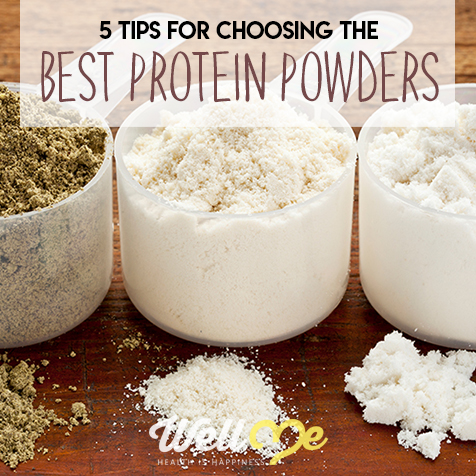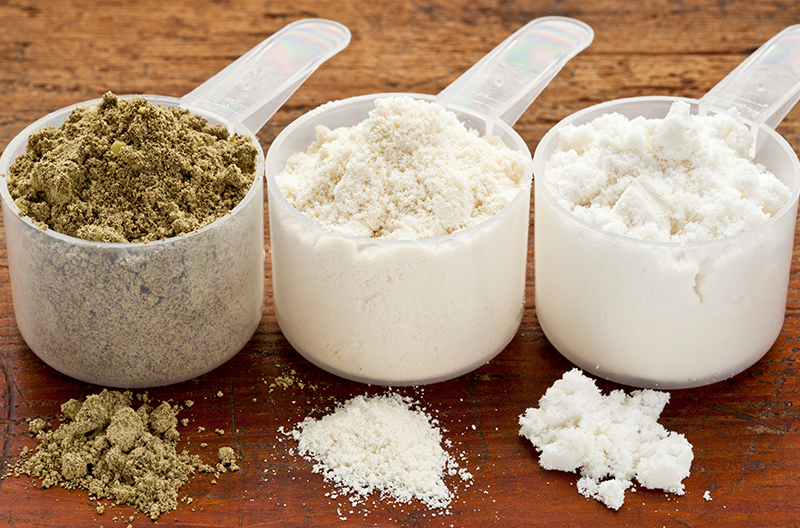If you’ve ever seen fitness discussed in the media, there’s a good chance you’ve been presented with a protein shake-chugging bodybuilder with too much grunting and a “hardcore” approach. The fact is that protein powders are a great option for many of us, providing a way to increase dietary protein intake in a convenient way, with the versatility to make any flavor you can imagine.
Protein powders are 10-a-penny on the market, and many of the choices you’re presented with are either the same as any other, or total bunk. The supplement industry is full of poor-quality products that are replete in heavy metals, which means that some of these “health and fitness” products are going to be detrimental to your health, especially the health of the liver.
This article is going to take you through the most important principles for deciding on a protein powder that will best fit your needs. The guidelines we’re providing are only going to be useful if you know yourself and know your health – always consult a medical professional before starting a course of supplementation and avoid protein powders if you suffer from serious kidney health problems.
Know Your Goals
The first thing to consider is what your goals are with buying protein powder. You might be new to nutrition and simply think that protein powder is a good idea because other people use it, especially those in great shape, but this is a common marketing strategy. Protein shakes are suitable for you if you have a very-high protein diet (as seen among Bodybuilders), need the convenience of a fast protein source, or are an athlete looking to maximize recovery.
The hard truth is that protein shakes are just a source of protein, like any other high-protein food. From a nutritional perspective, there isn’t much difference between the protein in a powder and the protein in milk, yogurt, or chicken breast. It’s important to keep in mind that, no matter what supplement companies say, protein powders are just milk by-products and don’t have supernatural muscle-building or fat-burning powers.
Weight Loss
Protein powders can play an excellent role in weight loss if you use them correctly and sustain a calorie-restricted diet. Protein has the highest satiety of any nutrient, keeping your fuller for longer and combatting cravings for unhealthy foods. In addition, it demonstrates the greatest capacity for thermogenesis – when you consume protein, around 20-30% of the calories in the food are required to digest, absorb, and utilize the nutrients themselves.[1] This makes protein powder a great way of increasing satiety in a shake with milk or water, stirred into oatmeal, or even baked into regular goods.
A high-protein diet is great for weight loss,[2] but is not sufficient to cause you to burn fat by itself: you still need to eat fewer calories than you use. The best approach to protein powder for weight loss is to simply look at the calorie content and find the powder with the highest contribution of calories from protein. This means that as many calories as possible should come from the protein itself and as few as possible from sugar and other “fillers” often found in protein powder.
Gaining Muscle
The most common reason for drinking protein shakes, or using protein powder as a staple of the diet, is to gain muscle. Muscle-building requires a huge amount of protein because the muscles themselves are made up of proteins that are “damaged” during exercise and need to be replaced and improved. Dietary protein does exactly that, so you’re going to benefit from a high-protein diet if you’re trying to build muscle.[3]
The rapid replenishment of nutrients in the body after a workout is a concern for those looking to build maximum muscle and recover from a workout. However, it is important to bust two myths surrounding protein intake. First, the “anabolic window” is not a brief of a period as many think – if you’re eating before and after exercise, within 3 to 5 hours of one another, you’re going to experience very similar levels of muscle growth.[4]
Second, protein shakes are no better or worse at delivering this protein to the muscles in time than, say, a chicken breast or milk. The only real benefit to using a protein shake is that it’s more convenient (you can carry the powder with you and mix it with water at the gym), and liquid sources of protein are generally faster-absorbing than solids.
What Type of Protein Fits Your Diet?
If you have special dietary needs, such as a kosher or plant-based diet, then this should be the starting point for your protein shopping. Simply put, you need a complete, bioavailable protein source that fits into the other dietary restrictions that you’ve chosen. Obviously, a vegan diet will rule out things like whey protein which are derived from dairy. This means that proteins like rice, pea, and soy are going to be better choices, with rice protein being the most bioavailable.
For those on a plant-based diet, the best choice is likely a blend of different sources, such as rice and pea. This provides the complete nutrient profile necessary to make the most of your protein powder but without the bioavailability issues that may be met from consuming just one of these protein sources.
If you’re an omnivore, whey protein isolate is likely to be your best choice. Whey protein has the highest bioavailability of any common protein source, is widely available at a great price, and is rapid-absorbing.
There are other sources that have their benefits and drawbacks, such as salmon or beef proteins for those who are unable to consume dairy, but these products are incredibly expensive and don’t provide many benefits above and beyond those of plant or dairy-based proteins.
Casein is similar to whey protein but, mainly through marketing devices, has been set out as a totally separate protein to whey. There are some small practical differences, but the overall effects on muscle-building are similar. The main difference is that casein is a slower-digesting protein and can be absorbed more effectively during long periods of rest or inactivity, which is why it is considered to be a pre-sleep protein, whereas whey is a post-exercise protein.
One of the unexpected benefits of casein is that, although it is derived from milk like whey, it is a gentler burden on the digestive system and is less likely to cause irregular bowel movements – a common complaint of whey proteins.
As with vegan blends, whey and casein are available as a blended product, offering a balance of slow- and fast-absorbing proteins. This is a great mid-ground for the average gym-goer, as they provide a more complete nutritional matrix and mitigate some of the digestive concerns that have been raised about the speed of absorption of whey protein. Be aware that blended proteins will likely cost more than their regular counterpart.
Key Factors for Choosing a Powder
With what has been said so far, you might think that there’s not really much setting protein powders apart, and you’re right. However, there are some important ways that you can still choose the protein powder that is right for you, your goals, and any other dietary requirements.
The first way of figuring out the best protein powder is simply the protein content: the more protein per serving, the better. Some supplement companies attempt to increase their recommended serving size to make their protein content seem better than it is. Always be sure to check the protein content and the serving size so you can be sure that you’re getting the most for your hard-earned money.
The second key factor is how much junk is in the powder. There will always be some form of sugar in these powders, but less is better. This is one of the main perks of plant-based proteins: they do not contain lactose, so their sugar content can be kept very low.
While sugar might be fine as part of an intra- or post-workout shake, you probably already have too much in your diet and contributing through a poor-quality protein supplement is only going to increase your risk of diabetes and other metabolic conditions.
Some protein powders are fortified with vitamins and minerals which is a fantastic, responsible way for supplement manufacturers to give their product the edge. If possible, aim for the protein powder with the widest variety and concentration of vitamins and minerals – some of these will be unnecessary, especially if you have a balanced diet, but ensuring that you’re not deficient is a great way to keep healthy and you’re unlikely to suffer any real health problems for consuming too many vitamins!
One of the most underrated ways that meal replacement shakes and other high-protein powders gain an advantage in the market is through an increased concentration of dietary fiber. Whilst this is not always present in traditional protein powders, it is possible that some high-quality supplements will include dietary fiber. Fiber is great for metabolic and digestive health, and can blunt some of the negative digestive effects seen with whey proteins, so be sure to aim for a higher fiber count if you have the bank balance and want to get the most from your protein powder.
Always Watch for Danger Signs
One of the most important things you should do for picking out a protein is simply to ensure that it is safe and that there are no dangerous chemicals present. The presence of excess heavy metals in whey proteins has been well-documented in recent years and caused some concern. The combination of large quantities of protein and heavy metals can place a serious burden on the liver and kidneys, and this is exactly the opposite of what you want from a “health supplement”.
Concerns have been raised regarding the content of lead, arsenic, cadmium, and mercury in as many as 15 of the leading protein brands.[5] Clearly, the idea that smaller and cheaper brands are going to be lower quality is a total fabrication – even the more expensive, popular brands are struggling with unnecessary heavy metal content and the health risks that come along with them. When choosing your protein, be sure to check for reports on heavy metals: an internet search is all it takes to find out whether you’re putting your health at risk.
In the United States, supplement companies are not regulated because they are food products (and rightly so). However, this means that the best supplement companies, those who have nothing to hide and want to prove their claims, have sought FDA-approval and Good Manufacturing Practice (GMP) certification. These are going to be the protein powders to look out for because, at the very least, they contain the things that they say and are produced in a way that won’t add any unnecessary ingredients that could be harmful to your health.
The final health warning to consider is the possibility that, when buying from larger supplement brands, your product may be tainted with anabolic steroids. This has been a serious concern for many athletes buying from distributors like Bodybuilding.com, who became embroiled in a court order after they put traces of oral steroids in their products to improve sales.[6] This is, fortunately, not as common as it was, but avoid taking “hyped” products that provide “miracle results” – if they live up to their claims, they’re probably disastrous for health.
Know Your Value
Given the relatively small differences between the many brands of protein powder on the market, one of the most important factors that should influence your decision is simply the price. Whey protein powders can reach astronomical prices, purely because of the marketing of these products and the number of people who will buy into these schemes. The fact is that the price of a single gram of protein is a great way to figure out what kind of protein you should buy.
Once you are sure that the product you’re buying is not dangerous, or that it contains the right amount of protein, the best deciding factor is simply how much you’re going to pay for it. There are many brands of protein powder available and the internet is making it easier to get your hands on top-quality supplements at low prices.
No longer do you have to go to the local GNC and pay whatever the shelf price is: low-price, high-quality supplements like MyProtein, Absolute Nutrition, and bulk powders re-defining the market. Don’t fall into the trap of clever marketing, or thinking that low-price means low-quality.
Summary: What Should You Do Now?
Overall, our approach to choosing the best protein powder glosses over some of the less important considerations like the kind of whey you’re using and the different brands and claims being made. This is totally intentional: protein powders are usually more similar than they are different, and there are so many on the market that you could search forever.
Protein powders aren’t magical muscle-building elixirs and some brands contain worrying chemicals that needn’t be included at all. What we recommend is to find a simple, no-frills supplement company that aims to provide you with exactly the basics – high-protein, low-sugar, and hopefully fortification with vitamins and minerals. If you can find a protein powder that does all of this with a decent price tag and compliance with good manufacturing practices, then you’ve found ‘the best protein powder’.

Action Steps: Tips for Finding the Best Protein Powder
- Always look for consumer reports on your products, search FDA warnings and make sure that you’re not buying products with heavy metals or steroids.
- Aim for a high protein content per serving but watch out to make sure you’re using the same serving size for all powders!
- Try and keep sugars low – you don’t need excess sugar, and you’ll taste it in the protein powder (not a good thing!).
- Look out for small bonuses like vitamin fortification.
- Watch the cost: aim for the most protein per dollar.
References
- [1] http://ajcn.nutrition.org/content/42/2/177.short
- [2] http://www.tandfonline.com/doi/abs/10.1080/07315724.2004.10719381
- [3] http://www.sciencedirect.com/science/article/pii/0026049594900051
- [4] https://jissn.biomedcentral.com/articles/10.1186/1550-2783-10-5?TB_iframe=true&width=921.6&height=921.6>
- [5] https://www.consumerreports.org/cro/2012/04/protein-drinks/index.htm
- [6] https://www.justice.gov/archive/usao/id/news/2012/may/bodybuilding05222012.html








